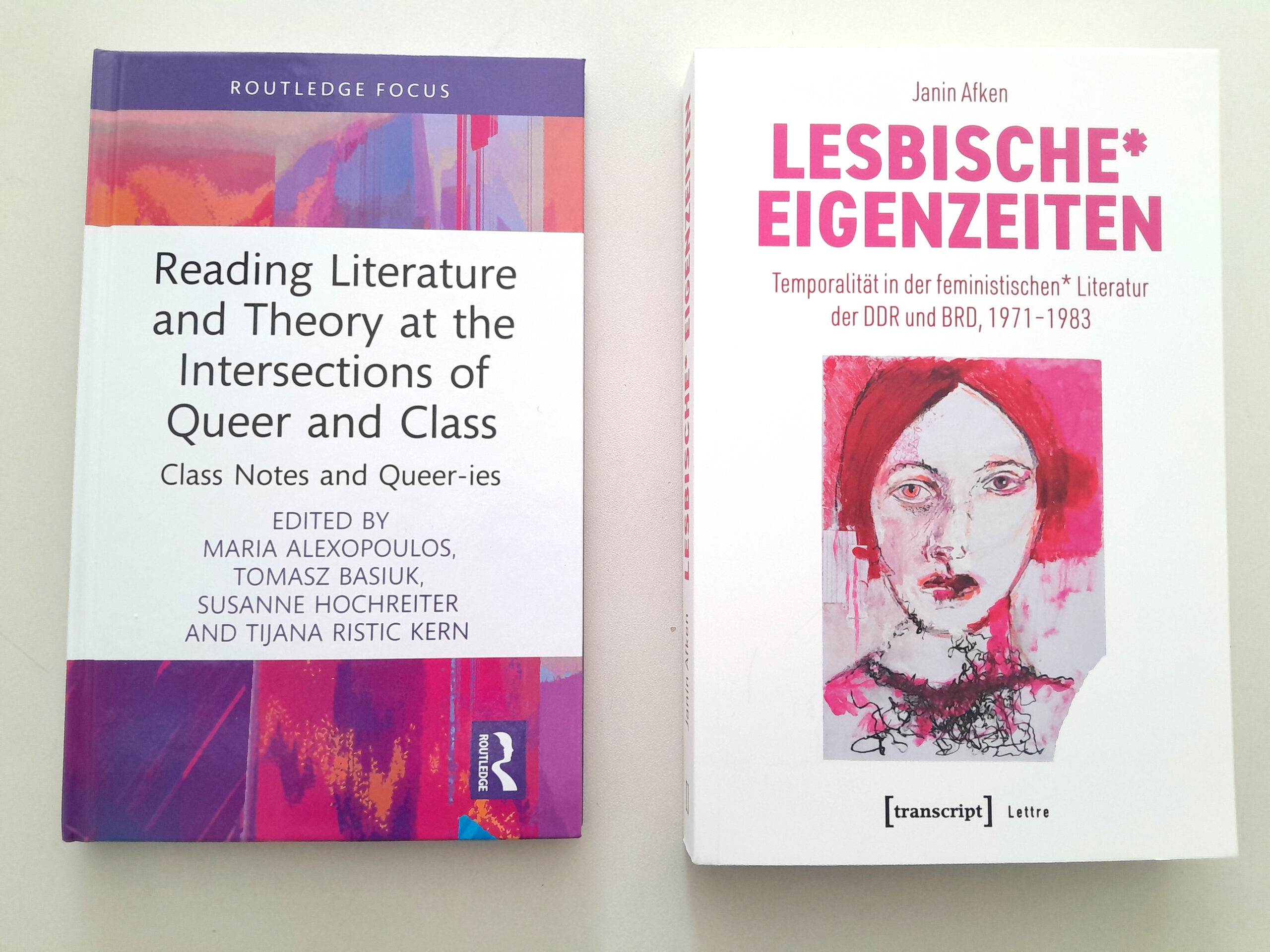Why do we (not) talk about our books? Book presentations are all too rare in the academic context, although they provide an important platform for making research and its results more visible, and for sharing it with the wider academic and non-academic communities. With this goal in mind, we brought together two recently published books stemming from projects on queer theory at the Faculty of Language, Literature and Humanities of HU Berlin. The idea of working together across the boundaries of different philologies was motivated by the established connections between scholars from HU Berlin and universities in Warsaw, Vienna, and British Columbia. They come from the fields of English, American, Canadian, Austrian, German, and Polish Literature and Studies, and work together within the research project Queer Theory in Transit: Reception, Translation and Production of Queer Theory in Polish and German Contexts (QUEERIT). Particularly in the philologies in Germany, where academic work in Queer Theory is still not institutionalized, such a dialogue opens up an enriching exchange between disciplines.
Gathering over 40 participants and guests, the hybrid book launch “Queer Politics of Class and Lesbian* Temporalities” took place on 9 December 2024 at Humboldt-Universität zu Berlin. It was organized by Gabi Jähnert (Center for Transdisciplinary Gender Studies), Eveline Kilian (Department of English and American Studies), Tijana Ristic Kern (Department of English and American Studies) and Janin Afken (Institute for German Literature). Presenting the two publications on lesbian* temporalities and queer theories of class, the event gave us a chance to discuss works that place a special focus on the methods and theories of queer and gender studies and offer new perspectives on feminist and queer topics in literary criticism.
Writing One’s Own Time: Feminist Lesbian* Temporalities
Felix Schmidt introduced Janin Afken’s monograph Lesbische* Eigenzeiten. Temporalität in der feministischen* Literatur der DDR und BRD, 1971–1983 (roughly translated into: Lesbian* Proper Times: Temporality in the Feminist* Literature of the GDR and FRG, 1971–1983), outlining its theme and research priorities. The dissertation was written as part of the European research project “Cruising the 1970s: Unearthing Pre-HIV/AIDS Queer Sexual Cultures” and is dedicated to a re-reading of often neglected feminist and queer texts from the 1970s in the Federal Republic of Germany (FRG) and the German Democratic Republic (GDR).
In six close readings, Afken examines three texts each from the FRG and the GDR. Drawing on genre analysis, narratology and intertextuality studies, she scrutinizes the works with a sensitive eye for heteronormative structures. Her analysis shows how these texts reveal a pronounced awareness of time and norms in patriarchal societies. This preoccupation with time and temporality was partly linked to the growing realization that women and lesbians had been excluded from history, but also to the lack of female and lesbian representation in literature. As a result, women and lesbians gradually developed their own sense of time, which was eventually reflected in literary texts. This process Afken aptly describes as a self-empowering act of “writing one’s own time.” Literature was thus used both as a tool against patriarchal structures and patterns of thought, and as a space for alternative concepts of life – particularly in relation to time and temporality, but also beyond – which could have an impact on non-literary reality.
Following Schmidt’s presentation, Afken talked about her personal queer-feminist research interests, which shaped her project, and shared her experiences in researching in Berlin’s queer archives Spinnboden Lesbenarchiv und Bibliothek Berlin, the FFBIZ and the Schwules Museum. Queer archives can give us an insight into the respective affect structures of the movements and therefore tell us a history of resistance, mourning, trauma, feelings of departure and happiness, of cohesion and conflicts within the movement groups.
Class Assignments: Queer Politics of Class
In her introduction to the collection Reading Literature and Theory at the Intersections of Queer and Class: Class Notes and Queer-ies, Prof. Elahe Haschemi Yekani pointed out its timelines in the context of the renewed interest in the questions of class in the humanities and of the necessity for new and intersectional approaches to the exploration of class. Co-authored by the research group Queer Theory and Literary Studies, gathering scholars from HU Berlin, University of British Columbia, University of Vienna, and University of Warsaw, who have worked together since 2017, this collection of essays is the product of discussions, panels, roundtables, and papers presented at numerous meetings, including the last three where all the contributions were workshopped. As both Haschemi Yekani and Tijana Ristic Kern, one of the co-editors, noted, the book can be seen as an ongoing conversation, an example of queer academic collective praxis, and a testament to the importance of fostering small international research networks.
The collection addresses a gap in the existing scholarship by considering the intersection of queer and class in relation to literary aesthetics and combining research on class from cultural and literary studies with queer political and theoretical perspectives. The authors read fiction, theoretical writing, personal essays, and manifestos, from English-, German-, and French-speaking contexts, and offer the essays as exemplary exercise in queer reading that posits class as a key analytical category, rather than a comprehensive queer theory of class. The articulation of the queer critique of class here is to an extent determined by the texts the authors read, but it also reflects their different positionings and showcases the diversity within queer theorizing. In the essays, class features, among others, as: material conditions of the constitution of gender and sexuality orders; as a social distinction determining and reflecting the value and liveability of (queer) lives; an inseparable category that both constitutes and is constituted in heteronormativity; or as a condition of precarity/precariousness that can be used to conceptualize the human condition as such.
Similarly, the questions the collection asks extend beyond literary readings to include questions of differences in our own social and classed positionings, of different resources and conditions of doing and teaching queer theory, and of a different understanding of how these two critical frameworks are interconnected and in which way class should figure in queer theoretical and literary inquiry and teaching.
Literature’s Alternative Spaces and Temporalities
A panel moderated by Eveline Kilian, one of the collection contributors, followed the book introductions. The authors and the guests discussed common points that the two publications foreground: the importance of the literary discourse for social criticism, and the role of temporalities in gender and queer scholarship. Susanne Hochreiter, the co-editor of the collection, pointed out that part of the motivation to work on this topic was the insight that most of the existing scholarly work addressing it, including that within queer theory, comes from the social sciences. As literary studies scholars, however, we see literary writing and criticism as a discourse that can probe social narratives of class and sexuality, and articulate the interaction between sexuality, gender, and class in a more sophisticated and complex manner, and thus also as an important site for the production of a queer theory of class. Adding to this, Anna Kurowicka, one of the collection contributors, elaborated on the potential of literary writing to imagine alternative spaces, narratives, and temporalities that resist heteronormative existence, and to provide a reprieve from timelines determined by capitalist class relations. Afken concluded that the aspect of writing alternative times to those imposed by patriarchy was central in her research on the significance of temporality in the women’s and lesbian movements of the 1970s in the FRG and, in a slightly different way, in the GDR as well.
In the closing discussion, the authors and the audience discussed the relative neglect of, or even a seeming resistance to, the topics of race, queer, and, to some extent, gender, in literary criticism and in humanities in general in the German scholarly discourse. Specifically, because of these “gaps” and very palpable silences, events such as this one are crucial, as their reach is not only transdisciplinary within academia, but also towards a broader audience.
Books presented:
Janin Afken’s Lesbische* Eigenzeiten. Temporalität in der feministischen* Literatur der DDR und BRD, 1971–1983 (Transcript Verlag, 2024)
Reading Literature and Theory at the Intersections of Queer and Class: Class Notes and Queer-ies, edited By Maria Alexopoulos, Tomasz Basiuk, Susanne Hochreiter, Tijana Ristic Kern; further contributors: Eveline Kilian, Karolina Krasuska, Anna Kurowicka, Ludmiła Janion, Julia Lingl, Naomi Lobnig, Krystyna Mazur, Tamara Radak and Anna Vida (Routledge, 2025, available in Open Access), https://doi.org/10.4324/9781032638669
Janin Afken is a postdoc researcher in two research projects at HU Berlin: Queer Reading – A Methodology. Literature in the Age of Paragraph 175 under the direction of Andreas Kraß (Institute for German Literature), and Queer Theory in Transit. Reception, Translation, and Production in Polish and German Contexts under the direction of Eveline Kilian (Department of English and American Studies). She completed her doctorate in 2022. Her thesis has been published as Lesbischen* Eigenzeiten. Temporalität in der feministischen* Literatur der DDR und BRD, 1971–1983.
Tijana Ristic Kern is a research associate at the Department of English and American Studies at HU Berlin. Her PhD project Writing the Queer Self looks at the interactions of queer life writing, fiction, and theoretical writing in the 20th century. Her research and teaching areas are modernism, postmodernism, life writing, hybrid writing, activist writing, queer and feminist theory, and archives. She is part of the Polish-German bilateral project Queer Theory in Transit (QUEERIT), and co-editor of Reading Literature and Theory at the Intersections of Queer and Class: Class Notes and Queer-ies.

